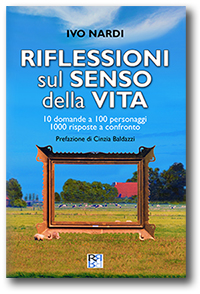
Reflections on the meaning of life
By Ivo Nardi
Riflessioni.it is the perfect place to stop and reflect on the meaning of life and we will do it through the answers that people of culture have given ten questions formulated by me.
Good reading.
Reflections on the meaning of life
Interview with P. Krishna
november 2012
Prof. P. Krishna is currently in charge of the Krishnamurti study center at the Rajghat Education Center of the Krishnamurti Foundation India in Varanasi, India He was the Rector of the center and Principal of the Rajghat Besant School from 1986 to 2002. He is a trustee of the Foundation and continues to be involved with its activities. He has written articles and books on various issues relating to the teachings of J. Krishnamurti .
He has also delivered lectures on Education, Science and Society to varied audiences.He is an Honorary scientist and Fellow of the Indian National Science Academy, New Delhi, as well as the Indian Academy of Sciences, Bangalore.
Before joining the Krishnamurti Foundation India , he was a professor of Physics at the Department of Physics, Banaras Hindu University, where had been a faculty member for 24 years. He specialized in Solid State Physics, his area of research and teaching being X-Ray Crystallography. www.pkrishna.org
1) Generally the big questions about life arise out of grief, illness, death and seldom during happy moments– which we all chase. What is happiness for you?
Happiness is a by-product of right living, which in turn requires wisdom. Theosophy literally means the quest for wisdom, which is the same as the quest for truth since the perception of truth ends illusion. The perception of what is true and what is false is self-knowledge which is the key to wisdom and therefore to happiness. Only then is happiness not dependant on circumstances.
2) What is love for you?
Love is a state of being in which there is compassion for all living beings without any self-interest or judgement.
3) How do you explain suffering in any form?
Ignorance as illusion is the cause of suffering. One must distinguish between personal suffering and the suffering due to compassion. Personal suffering ends when the mind is freed of all illusion. The ego is the greatest source of illusion and therefore freedom from the ego is the beginning of wisdom and the end of psychological suffering.
4) What is death for you?
Death of the body is a natural fact of all life and therefore a part of living. There is real creative and joyous living only when one dies to the ego, which is attachment to the personality. That is also freedom from conditioning due to the past or the known.
5) We know we are born, we know we will die and within this temporal space we live and build up a route; for some this is lived consciously, for others unconsciously. What are your objectives in life and what do you do to realize them?
To me the whole of life is a ground for learning, not only learning about the external world but also learning to distinguish what is true from what is false. Life is a great mystery and understanding that mystery is the objective of my life. The rest is a by-product of the wisdom so generated.
6) Do we have an existential project to perform?
Being true to oneself and therefore to others is a major responsibility in addition to whatever other responsibility one takes up in life. This again is a by-product of self-knowledge or wisdom.
7) We are social animals, our life would have no meaning without the others, notwithstanding that we live in an era where individualism is more exalted than ever. This brings about a social involution: what do you think of that?
Individualism is an illusion. We are inextricably linked to each other and to the entire universe around us. To separate oneself from the world and treat it as something meant for one’s use is narrow-minded egoism. It is the greatest source of all suffering, both personal and global.
8) How can we recognize good and evil?
To the extent we are capable of being egoistic we have the capacity for evil. Any action born of the ego state is evil irrespective of what results it achieves outwardly and any action born of love and compassion is right action irrespective of what it achieves externally.
9) Man has always been distressed by the unknown. Religions, and afterwards philosophies with the aid of reason, gave him some help. What help did you have?
Theosophy and Krishnamurti taught me that religion is not belief but the quest for truth. That we can grow in wisdom if we have a learning mind and look upon life as a mystery to be lived and learnt from. The known is very limited and the awareness of the existence of the vast unknown brings humility. Our knowledge leads to arrogance when it is not coupled with wisdom and blocks learning.
10) What is for you the meaning of life?
Life is not a problem to be solved; it is a mystery to be lived.
Versione italiana: Intervista a P. Krishna
Su Amazon NUOVA EDIZIONE RIFLESSIONI SUL SENSO DELLA VITA "Riflessioni sul Senso della Vita" di Ivo Nardi, invita il lettore a esplorare le grandi questioni dell'esistenza attraverso una raccolta di risposte provenienti da personaggi di diversa estrazione culturale e filosofica. Organizzato attorno a dieci domande esistenziali — dalla felicità all'amore, dalla sofferenza alla morte — il libro offre un affascinante viaggio intellettuale che stimola la riflessione personale. |
